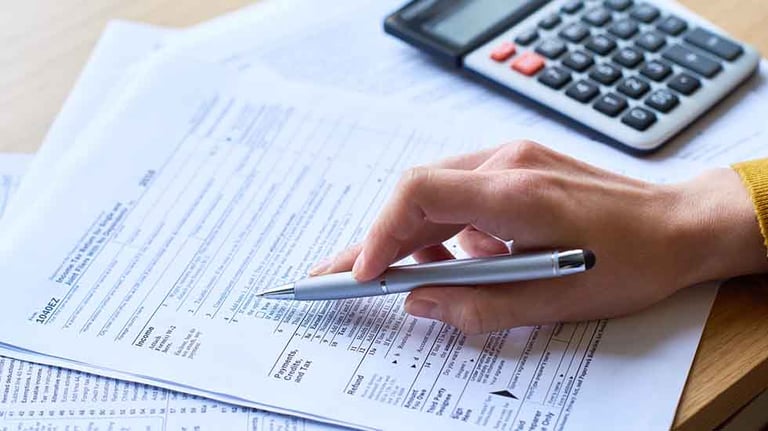7 financial lessons you didn’t learn in school
A little financial education could save you big money


Many adults claim they missed out on financial education in school. Some of these concepts might be costing you and your family valuable money. Although educational institutions may have failed to recognize the value of financial literacy as one of the critical skills many need to succeed in this day in age, there is still time to grasp the concepts you missed out on and put them to use.
Filing your taxes
Filing your taxes can be a scary process for people due to their lack of knowledge. With the tax codes changing rapidly, it’s hard to keep up with what you should know about filing your taxes. While most people can use software to navigate filings such as Turbo Tax or H&R Block, others should partner with an accountant to make sure that they’re making the right payments and getting the largest possible tax return.
A few tax basics include filing your taxes on time and understanding filing deductions. Every year, individuals must file their taxes by April 15th.If you don’t file your taxes on time, you could face a late penalty. If you owe taxes and can’t pay your taxes outright, the IRS has payment plans to help you repay everything you owe.
Deductions can reduce your total income and the amount you must pay on your taxes. Knowing your deductions can help you save on your tax bill. Therefore, do some research on standard deductions or speak with your accountant.

Taking on student debt
Some people know that they want to go to college but do not have money saved up. Some private universities can cost over $50,000 per year, so it is difficult for anyone to save up enough to cover their higher education costs.
Student loans take a long time to pay off and it’s always important to fill out your FAFSA form. The standard repayment plan requires borrowers to repay their loans for over ten years. However, if you consolidate your loans or need to make smaller payments, you could end up paying for your education for decades.
The Free Application for Federal Student Aid (FAFSA) is the only way students can qualify for government loans and grants. The government-subsidized and unsubsidized loans typically have much lower interest rates than private loans and are, therefore, the best loans available to students.
Building credit
Your credit score is what will help you qualify for loans in the future, including a mortgage. To ensure you build good credit, you may want to start by paying off your credit card monthly. When you do not pay off your credit card, the balance that carries over accrues interest. Therefore, you’ll end up paying more on your credit card than what the items you purchased were worth.
It’s also wise to keep your credit utilization rate low. Several things calculate your credit score, and one of them is credit usage. Therefore, you should keep your credit usage low. For example, if your credit card has a $1,000 limit, you should never use more than $300 of that limit without paying off your balance.

Creating a budget
The best way to know how much you earn, save, and spend is to create a budget. Giving yourself parameters to spend within will help you be intentional about saving and investing, and ultimately set you up for future success.
There are plenty of budget theories available online. You might want to research the 50-30-20 budgeting rule or zero-based budgeting to get an idea of what budget will work best for you. The hardest part of a budget is sticking to it, so be sure to revisit it often to make changes based on your lifestyle and keep yourself accountable.
Capitalizing on compound interest
Did you know that your money can make money? That’s what compound interest does. Compound interest occurs when you invest money and it earns interest, then the interest is reinvested. For example, if you invest $1,000 at 4% compounding interest. After a year, your $1,000 will turn in to $1,040. The following year, the $1,040 will earn 4% interest, and the account will grow to $1,081.60. This pattern will repeat, and the interest earned on your money will continue to grow.

Start saving and investing at an early age
For compounding interest to have the maximum effect, it’s wise to start saving and investing at an early age. Investing early will give your money more time to earn interest and will allow you to invest more of your money over time.
Keeping with the same example as above. Let’s assume that you invest $1,000 per year starting at age 35 until you retire at 65 at 4% interest. You’ll have invested $30,000 of your money, but the account will have a balance of $56,085. However, if you started investing at age 25 instead of 35, you would have contributed $40,000, and the account would have a balance of $95,025. Therefore, take advantage of compounding interest and start saving and investing as early as possible.
Negotiating is an important financial skill
Negotiations happen around us all the time. From purchasing a used car to getting the best rates on insurance, having good negotiation skills pays off. Even when selling, negotiation skills can help you put more money in your pocket. Excellent negotiation skills mean lower monthly payments, smaller upfront purchases, and more advantageous deals when selling something.
The bottom line
School taught us a lot of things, but in general, financial education was lacking. However, it’s not too late to fine-tune some of the skills you need to be better about money. Take the time to educate yourself on personal finance. It will make all the difference in your ability to live and retire well.
